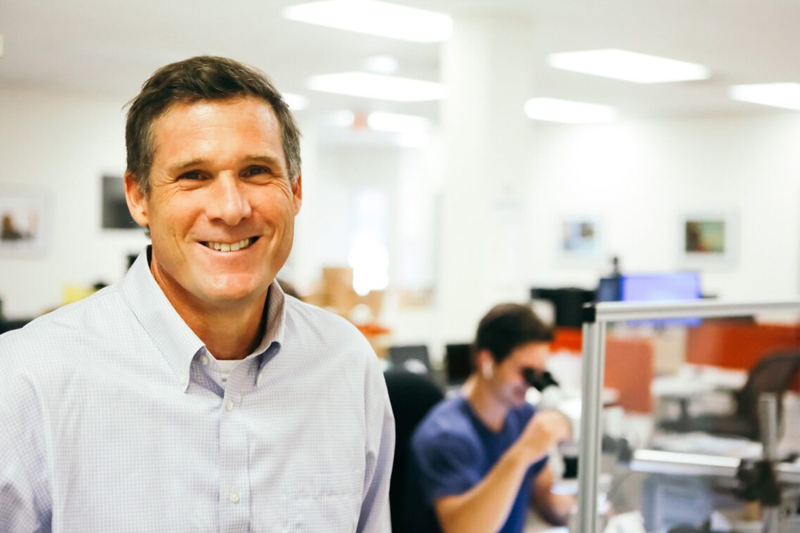
Brian Jamieson founded Diagnostics Biochips to unlock the inner workings of the brain.
Based in Glen Burnie, the medical equipment manufacturing company develops tiny sensors that can be implanted to study electrical brain activity. The goal? To help find cures for neurological diseases like Parkinson’s, epilepsy and others.
Diagnostic Biochips also offers a data analysis platform called DBCloud that tracks and organizes the vast neural activity captured by its sensors. Together, these tools give researchers a window into what Jamieson describes as the brain’s “matrix.”
“If you’re probing a network or a computer and you want to see the 1s and 0s that make up the basic operation of a microprocessor, it’s the same thing with your brain,” Jamieson said. “What is the basic underlying machine-level code of your brain? It’s not a perfect metaphor, but it has some of the same characteristics in that you have all these basic elements that are connected.”

A loan that led to a new line of business
The State of Maryland’s venture capital arm, TEDCO, was one of the first to bet on Diagnostic Biochips, providing a seed investment that helped bring the company to life in 2013.
When the company first launched, it focused on building tools for in vivo applications, i.e., research with live animals. After a decade in this line of business, Jamieson had aspirations to scale up.
In 2023, he turned his attention to advanced stem cell models such as pluripotent stem cells (known as iPSCs) and 3D cultures called organoids. Brain organoid models are miniature, lab-grown versions of the human brain small enough to fit in a petri dish that replicate key properties of a developing, normal or diseased brain. Using these models, researchers can drastically boost the volume and efficiency of their data collection.
“Instead of doing individual surgeries on animals, now we’re scanning 96 brains at a time,” Jamieson said.
To support this pivot, Diagnostic Biochips started seeking funding for stem cell research. That search led Jamieson to apply for the Maryland Stem Cell Research Fund (MSCRF) in December 2024.
Maryland promotes continued growth
The MSCRF is an independent program within TEDCO created to promote state-funded human stem cell research and medical treatments through grants to public and private entities in Maryland.
The program focuses on identifying and fostering cutting-edge research and innovation in the field of regenerative medicine. It offers non-dilutive funding, meaning it doesn’t take equity or shares in return for the investment.
The MSCRF launched its first two grant programs in 2007. That has now expanded to seven programs providing funding across the entire innovation pipeline, from supporting basic research to clinical trials and commercialization. In the last eight years alone, the MSCRF has provided more than $21 million in non-dilutive grant funding for around 30 companies.
“Our mission is that we not only support scientific discovery, but also support those technologies to move from bench to bedside, so we can ultimately improve patient outcomes,” said Ruchika Nijhara, executive director of the MSCRF.

Wired for collaboration
With the MSCRF generating over 2,000 jobs in the last few years alone, it’s clear that concerted efforts toward advancement in this industry have been productive for the state.
And the MSCRF isn’t alone in fighting shifting attitudes toward scientific research.
The MSCRF collaborates closely with the Maryland Department of Commerce to help startups and established companies navigate state resources, funding and prospective partnerships.
The Department of Commerce makes companies aware of benefits like grant and tax credit programs, and has hosted events with the MSCRF to bring together investors, companies and prospective entrepreneurs.
Moreover, it connects companies with funding, workforce programs and academic partnerships. It also frequently organizes events that help companies interact with critical federal agencies like the US Food and Drug Administration (FDA), based in Maryland.
“People are more than ever actively looking for access to different types of resources,” said Stefanie Trop, director of Maryland’s Office of Life Sciences. “This competition and the overall business climate is impacting entrepreneurs in a lot of different ways. That’s just made us ramp up our efforts so we can be most supportive and help identify other resources for business and individuals who are directly impacted.”
The support extends beyond money. Trop said the most fulfilling part of her job is following up with the companies her office assists and seeing them succeed.
“It is really rewarding to see that with one email or one phone call, pulling two people together at an event, or taking a founder to a conference, it could totally change the growth trajectory of their company,” she said.
And the MSCRF allows its portfolio companies to return anytime for additional resources or support.
“We still work with some of the companies that are now testing their therapies in clinical trials and looking for partners,” Nijhara said. “We consider ourselves as the connective tissue. And it does not just end when they’re done with the grant, but throughout their life. They have been portfolio companies for all these years, and we’ll continue to support them because that’s our mission. We want to advance these therapies so they get to patients.”
Source: Technical.ly